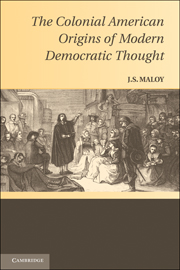Book contents
- Frontmatter
- Contents
- Preface
- 1 Introduction: Accountability and Democratic Theory
- 2 Radical Trust and Accountability in the Seventeenth Century
- 3 Fidelity and Accountability in Virginia and Bermuda
- 4 Politics and Ecclesiastics in Plymouth and Massachusetts
- 5 Constitutional Conflict and Political Argument at Boston
- 6 Democratic Constitutionalism in Connecticut and Rhode Island
- 7 Conclusion: Anglophone Radicalism and Popular Control
- Bibliography
- Index
6 - Democratic Constitutionalism in Connecticut and Rhode Island
Published online by Cambridge University Press: 03 December 2009
- Frontmatter
- Contents
- Preface
- 1 Introduction: Accountability and Democratic Theory
- 2 Radical Trust and Accountability in the Seventeenth Century
- 3 Fidelity and Accountability in Virginia and Bermuda
- 4 Politics and Ecclesiastics in Plymouth and Massachusetts
- 5 Constitutional Conflict and Political Argument at Boston
- 6 Democratic Constitutionalism in Connecticut and Rhode Island
- 7 Conclusion: Anglophone Radicalism and Popular Control
- Bibliography
- Index
Summary
In order to gain a clear and just idea of the design and end of government, let us suppose a small number of persons settled in some sequestered part of the earth. … They will then represent the first peopling of any country. … As the colony increases … the distance at which the members may be separated will render it too inconvenient for all of them to meet. … This will point out the convenience of their consenting to leave the legislative part to be managed by a select number chosen from the whole body. … And that the elected might never form to themselves an interest separate from the electors, prudence will point out the propriety of having elections often; because as the elected might by that means return and mix again with the general body of the electors … their fidelity to the public will be secured by the prudent reflection of not making a rod for themselves. … Here then is the origin and rise of government.
Thomas Paine, 1776 (Paine 1987, 67–8)By the time their agents in the Continental Congress had put their signatures to the Declaration of Independence in July 1776, several of the American colonies had already begun to revise their constitutions; most of the rest would soon follow suit. Thanks in part to recent experience with the exercise of executive power by George III and his various colonial deputies, and in part to the rhetorical purchase of anti-monarchic polemics like Paine's Common Sense (published in January of that year), the new constitutions shifted power away from governors and executive councils toward elected legislatures.
- Type
- Chapter
- Information
- The Colonial American Origins of Modern Democratic Thought , pp. 140 - 170Publisher: Cambridge University PressPrint publication year: 2008



